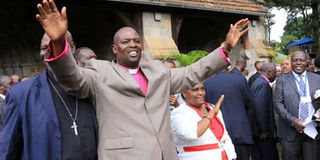Bishop Jackson Ole Sapit of Kericho elected Anglican Church head

Electoral college members of the Anglican Church of Kenya on May 20, 2016 introduce Bishop Jackson Ole Sapit, who was elected head of the Church, succeeding outgoing Archbishop Eliud Wabukhala. Standing on the right is his wife Esther Naserian. PHOTO | JEFF ANGOTE | NATION MEDIA GROUP
What you need to know:
- Bishop Ole Sapit was elected through secret ballot by an electoral college of about 190 members drawn from 37 dioceses countrywide.
- The 51-year-old archbishop-in-waiting will be consecrated and enthroned at All Saints Cathedral to take the seat of archbishop of the Anglican Church of Kenya on July 3.
- Previously, he served as the chairman of the Narok Integrated Development Board. He has also served as a member of the Church Army Africa Board and chairman of ADS Kenya Board.
Bishop Jackson Nasoore Ole Sapit of Kericho Diocese is the archbishop-elect of the Anglican Church of Kenya.
Bishop Ole Sapit will succeed Bishop Eliud Wabukhala as the sixth archbishop of the ACK, after trouncing five other bishops in the race.
He was elected through secret ballot by an electoral college of about 190 members drawn from 37 dioceses countrywide.
At the top of his agenda will be to unite the church, with a special interest in pastoralist communities, youths and children.
“Indeed the church has spoken and the voice of the people who have spoken is the voice of God. I am coming as a humble servant. The focus right now is to unite this church so that we can unite this country,” he said in his acceptance speech.
Other bishops in the race were Joel Waweru (Nairobi), Julius Wanyoike (Thika), Lawrence Dena (Malindi), James Kenneth (Southern Nyanza) and Moses Nthuka (Mbeere).
In his concession speech, Rev Dena said he would support the new archbishop as was agreed before the elections.
“I am satisfied with the results, I have accepted those results and I want to assure my brother the archbishop Ole Sapit of my support,” said Bishop Dena.
The 51-year-old archbishop-in-waiting will be consecrated and enthroned at All Saints Cathedral to take the seat of archbishop of the Anglican Church of Kenya on July 3.
Previously, he served as the chairman of the Narok Integrated Development Board. He has also served as a member of the Church Army Africa Board and chairman of ADS Kenya Board.
He holds a Bachelor of Divinity degree from St. Paul’s University and a Master of Arts in social development and sustainable livelihoods from the University of Reading in the UK.
THE ELECTION PROCESS
The election of an archbishop starts with the nomination of candidates (bishops) by other bishops from different dioceses.
The names of the candidates are then published and the provincial chancellor picks an election date.
An electoral college is assembled to vote in the archbishop. The electoral college consists of five people from every diocese, including the bishop, two clerics and two from the laity.
The delegates are drawn from 37 of the 38 dioceses countrywide, with the exception of the episcopal of the armed forces.
The winner should meet the threshold of a two thirds majority and if the person with the highest number of votes does not garner two thirds of the vote, the electors move to the next round by knocking out the person with the least vote.
In the event that two final candidates receive a comparable number of votes, the winner is chosen through a simple majority.





